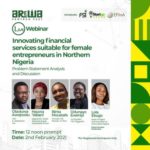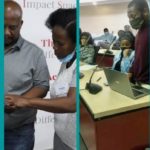Impact Stories from Entrepreneurship Policy Area

Fellow shares lessons from career and advice for women in tech
Fellow(s): Samia Elhanchi
Country: Morocco
Cohort: 2017
Policy Area(s): Economic Impact, Empowering Women and Girls, Entrepreneurship, Professional Growth
2017 fellow Samia Elhanchi recently published an article in GeeX Review, the first developer magazine in the MENA region. The fifth edition of the magazine was themed on women in tech in honor of Women’s History Month, highlighting women innovators and leaders who have made an impact in MENA.
Samia, a senior project manager at Orange Maroc, wrote about the lessons she has learned as a woman in tech, the importance of amplifying women’s voices and tips for women to succeed in business. Samia emphasized that, although women are gaining representation in STEM — 43% of engineering students in Morocco are women – a retention issue remains. “Women are lost through the career ladder,” she wrote. Samia also shared four of the lessons she’s learned throughout her career: build your network, develop your personal brand, never stop learning and get a mentor. “The best gift you can ever get is a great mentor,” she wrote.
Report Date...: 3/8/21

At FemTech Fest fellows support women entrepreneurs
Fellow(s): Binta Moustapha and Stella Uzochukwu
Country: Nigeria
Cohort: 2014, 2019
Policy Area(s): Economic Impact, Empowering Women and Girls, Entrepreneurship, Professional Growth
Women operate 41% of micro businesses in Nigeria, yet 55% of financially excluded adults in Nigeria are women. At this year’s Arewa FemTech Fest, a virtual event and hackathon, 2014 fellow Binta Moustapha and 2019 fellow Stella Uzochukwu helped address the challenges and needs of Northern Nigeria’s women entrepreneurs. The event was organized by Financial Services Innovators, a Nigerian association, alongside Startup Arewa, an incubator for tech entrepreneurs.
The event’s mission was to increase financial inclusion among women entrepreneurs by introducing simple and easy-to-use Fintech for Micro, Small and Medium Enterprises (MSME’s) in Northern Nigeria. In the kick-off event, Binta, joined by CEOs and local Fintech leaders, participated in a webinar that discussed the needs of women entrepreneurs. Binta is the founder of 100 Women in Tech Nigeria, an initiative that amplifies Nigerian women leaders. Together, the panelists spoke about how financial services can serve women and the ways in which Fintech solutions can be made accessible to all.
The webinar was followed by an eight-day virtual hackathon where over 100 innovators designed practical solutions for the women entrepreneurs. Stella, the country director for the Odyssey Educational Foundation, served as a judge, helping choose the first, second and third place winners, all of whom received cash prizes to bring their solutions to market.
Report Date...: 2/22/21

Fellow is first Jordanian to be named 2021 Influential Leader
Fellow(s): Hiba Shabrouq
Country: Jordan
Cohort: 2017
Policy Area(s): Education Diplomacy/Mentoring, Empowering Women and Girls, Entrepreneurship, Professional Growth, Youth Engagement
This week, 2017 fellow Hiba Shabrouq was named a 2021 Influential Leader by The Association to Advance Collegiate Schools of Business (AACSB), an international association that brings together business, students and educators to amplify innovation and impact business education. The annual initiative recognizes leaders who are using their business education to create impact.
Hiba, the first Jordanian to be honored by AACSB, was nominated by Princess Sumaya University For Technology. She was highlighted in the “Diversity and Inclusion” category. In her feature, Hiba is recognized for co-founding Ozwah, a 2017 TechWomen seed grant-winning mentorship and training program for Jordanian girls in orphanages. She is also a financial skills mentor at INJAZ, a Jordanian nonprofit that trains young people with entrepreneurship and financial skills.
Report Date...: 2/22/21

Through Ekasi Pioneers fellow helps over 100 rural businesses
Fellow(s): Nobukhosi Dlamini
Country: South Africa
Cohort: 2019
Policy Area(s): Economic Impact, Empowering Women and Girls, Entrepreneurship, Professional Growth
In response to the COVID-19 pandemic, 2019 fellow Nobukhosi Dlamini launched a digital enablement program that supports women-led small businesses in rural South Africa. The program, Ekasi Pioneers, is implemented through the GIFT Foundation, Nobukhosi’s NGO that connects rural women and girls to tech training and job opportunities.
Kicking-off with funding from the U.S. Consulate General Cape Town, GIFT created its first virtual digital enablement training for 50 rural female small business owners, supporting them in pivoting their businesses from in-person to online operations. Through a comprehensive curriculum which included lessons in digital marketing, purchasing and setting up a website, online advertising and scaling an online business, the women learned how to successfully migrate their businesses in order to adhere to local social distancing and lockdown regulations. They were also trained in soft skills, learning about leadership, confidence-building and adopting a growth mindset. At the end of the training, all 50 businesses – catering companies, construction businesses, retail stores and more – successfully migrated online. “These women are reporting that the visibility of their businesses has increased, they are receiving more inquiries and sales and their businesses have been able to weather the storms of the COVID-19 pandemic,” says Nobukhosi. GIFT has already begun a second digital enablement training with funding from the UK government; their cohort of 60 women is due to graduate later this month.
Report Date...: 2/15/21

Fellow authors post for UN Women’s Generation Equality
Fellow(s): Kyzzhibek Batyrkanova
Country: Kyrgyzstan
Cohort: 2019
Policy Area(s): Economic Impact, Education Diplomacy/Mentoring, Empowering Women and Girls, Entrepreneurship, Professional Growth
2019 fellow Kyzzhibek Batyrkanova authored a post for UN Women’s Generation Equality campaign, writing about the challenges women and girls face and calling for greater awareness of gender issues among educators, media and leaders.
Kyzzhibek is the program director for the Kyrgyz Space Programme, an all-women team working to build Kyrgyzstan’s first nanosatellite. The core team is comprised of women ages 18-24, many of whom are not trained in STEM fields. Together, they are learning skills in robotics, 3D printing, engineering and satellite technology, innovating for their country and combatting stereotypes along the way.
In her post, Kyzzhibek writes that many expect their project to fail, just because of their gender: “The first element [for failure] for them is the presence of women and girls in the team,” she writes. As a response, Kyzzhibek and her team are motivated to fulfill their mission of educating women and girls in STEM while raising awareness about inequity. “The program has an amazing mission to empower girls and women in science and raise awareness about gender inequality and harmful social norms, which require systemic change,” she writes. “We want to show by our own example that girls are capable of anything, even reaching for the stars.”
Report Date...: 2/8/21

Mentor(s): Paria Rajai (mentor)
Company: ModelExpand
Mentor Type: Impact
Policy Area(s): Economic Impact, Empowering Women and Girls, Entrepreneurship, Professional Growth
TechWomen mentor Paria Rajai recently co-authored an article on why women of color are historically undervalued when it comes to leadership roles, and the steps companies can take to spark systemic change. The article, Does Your Definition of Leadership Exclude Women of Color?, was published by Harvard Business Review.
Paria is the founder and CEO of ModelExpand, a workplace strategy firm centered on inclusion, fair hiring and helping companies build a diverse workforce. Paria’s co-author, Marlette Jackson, serves as an advisor for ModelExpand. “The attributes companies often look for in leaders, such as competitive, dominant, objective, self-confident, aggressive, ambitious, are overwhelmingly masculine,” they write. “This leaves women of color (WOC) at a double disadvantage: They often don’t fit companies’ measures for leadership, because those measures were developed for someone else.” Paria and Marlette argue that creating change does not necessarily require “reinventing the wheel;” instead, companies can start to redefine leadership by adjusting hiring and retention criteria and providing more resources to employees.
Report Date...: 2/8/21

Fellow chosen as young innovator to speak to Kenyan president
Fellow(s): Crescence Elodie
Country: Cameroon
Cohort: 2019
Policy Area(s): Economic Impact, Entrepreneurship, Professional Growth
This week, 2019 fellow Crescence Elodie was one of four young leaders selected to participate on a panel with Kenyan president Uhuru Kenyatta. The conversation was a part of the 2021 Africa Business Forum, an event organized by the United Nations Economic Commission for Africa.
Crescence is the founder of EN Group, a platform that focuses on digital and community development through technology, as well as the founder of WETECH, an initiative that supports and trains women with tech and entrepreneurship skills. The panel, “Young Entrepreneurs in Conversation,” focused on digital inclusion and how the African continent can thrive during the fourth industrial revolution. “I wanted to make sure women are more included in the development of his country, especially through technology,” Crescence said.
Report Date...: 2/8/21

Fellow’s startup selected for Google’s first MENA accelerator
Fellow(s): Ameni Mansouri
Country: Tunisia
Cohort: 2018
Policy Area(s): Economic Impact, Entrepreneurship, Professional Growth
This week, it was announced that Dabchy, the company co-founded by 2018 fellow Ameni Mansouri, was selected to participate in Google’s first accelerator program in the MENA region. Dabchy is Tunisia’s first web-based fashion marketplace, featuring an online platform that allows its 400,000 users to buy and sell secondhand clothing, accessories and beauty products in three countries. Last year, Dabchy was one of seven businesses named a winner of the Orange Ventures MEA Seed Challenge. Recently, the company announced that over one million items have been listed by its users, making it one of the largest online marketplaces in the region.
Google for Startups Accelerator selects top startups, pairing them with experts at Google who can provide customized support and help solve their greatest challenges. The three-month program offers workshops on product design, customer acquisition and leadership development for founders, as well as mentorship from over 20 teams at Google to provide the expertise the startups need. Google selected 10 startups out of 500 applications for their first MENA cohort; Dabchy is the only company representing Tunisia. Since the announcement, Ameni has been interviewed on local television and radio, speaking about Dabchy’s growth and their goals for the future. “I’m proud to always represent Tunisia,” she said.
Report Date...: 2/1/21

Fellow guest hosts podcast on fintech and innovation
Fellow(s): Adejoke Adekunle
Country: Nigeria
Cohort: 2019
Policy Area(s): Entrepreneurship, Professional Growth
2019 fellow Adejoke Adekunle has been invited to be a monthly host for the Voice of Fintech podcast, a weekly interview series based in Switzerland that features leaders in the financial technology sector. Adejoke is the CEO of VVM Group as well as the founder of the African Tech Woman, a podcast and network for female founders.
Last week, Voice of Fintech debuted the first Voice of FinTech: Africa Series with Adejoke as a monthly guest host. Her first guest, Jehiel Oliver, is the CEO of Hello Tractor, a social enterprise agtech company known as the “Uber for farms” that connects smallholder farmers to machinery through their app. In the episode, Adejoke asked Jehiel to share his strategies and challenges, as well as expand on Hello Tractor’s AI-enabled digital wallet for farmers. Adejoke will welcome a new guest next month, and looks forward to amplifying diverse leaders in fintech on the African continent.
Report Date...: 2/1/21

Fellow shares advice for women entrepreneurs in Jordan
Fellow(s): Reema Diab
Country: Jordan
Cohort: 2019
Policy Area(s): Economic Impact, Education Diplomacy/Mentoring, Empowering Women and Girls, Entrepreneurship, Professional Growth, Youth Engagement
2019 fellow Reema Diab was featured in an “Ask Me Anything” session for women in technology, sharing her experience as an entrepreneur and answering questions on how to succeed as a woman in technology in Jordan. The event was organized by the Exchange Alumni team at the U.S. Embassy in Jordan as part of their monthly sessions that feature exchange program alumni.
Reema is the founder of Galaxy Organization for Technology, an IT non- profit that empowers women and youth with STEM skills. Their latest course for kids offers hands-on training in robotics, teaching them about Arduino technology and helping them build small robots controlled by phones via Bluetooth. At the online event, Reema spoke about what makes a successful entrepreneur, how new businesses can seek funding and how her participation in the TechWomen program helped build her entrepreneurial skills. She also shared the obstacles that women face as entrepreneurs, giving the audience advice on succeeding as a woman in technology. “It can be difficult as a woman trying to compete,” she said. “Unfortunately, women often are not confident or underestimate their skills. It’s important to find a support system and to find a mentor.” She encouraged women to find their passion and work hard on their skills by seeking out programs that support their goals. “The TechWomen program was life-changing. Gathering with like-minded women opened doors for me to be a leader,” she said.
Report Date...: 1/25/21

